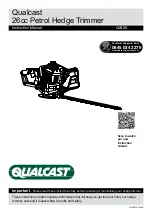
10
of the appliance by a person responsible for their
safety. Children should be supervised to ensure
that they do not play with the appliance.
10.
Use the tool with the utmost care and attention.
11.
Operate the tool only if you are in good physical
condition. Perform all work calmly and carefully.
Use common sense and keep in mind that the
operator or user is responsible for accidents or
hazards occurring to other people or their
property.
12.
Never operate the tool when tired, feeling ill or
under the influence of alcohol or drugs.
13.
The tool should be switched off immediately if it
shows any signs of unusual operation.
Intended use of the tool
1.
Use right tool. The cordless grass trimmer is only
intended for cutting grass, light weeds. It should
not be used for any other purpose such as hedge
cutting as this may cause injury.
Personal protective equipment (Fig. 1 & 2)
1.
Dress properly. The clothing worn should be
functional and appropriate, i.e. it should be tight-
fitting but not cause hindrance. Do not wear either
jewelry or clothing which could become entangled
with high grass. Wear protective hair covering to
contain long hair.
2.
When using the tool, always wear sturdy shoes
with a non-slip sole. This protects against injuries
and ensures a good footing.
3.
Wear protective glasses or goggles.
Electrical and battery safety
1.
Avoid dangerous environment. Don’t use the tool
in damp or wet locations or expose it to rain.
Water entering the tool will increase the risk of
electric shock.
2.
Recharge only with the charger specified by the
manufacturer. A charger that is suitable for one
type of battery pack may create a risk of fire when
used with another battery pack.
3.
Use power tools only with specifically designated
battery packs. Use of any other battery packs may
create a risk of injury and fire.
4.
When battery pack is not in use, keep it away from
other metal objects, like paper clips, coins, keys,
nails, screws or other small metal objects, that
can make a connection from one terminal to
another. Shorting the battery terminals together
may cause burns or a fire.
5. Under abusive conditions, liquid may be ejected from
the battery; avoid contact. If contact accidentally
occurs, flush with water. If liquid contacts eyes, seek
medical help. Liquid ejected from the battery may
cause irritation or burns.
6.
Do not dispose of the battery(ies) in a fire. The cell
may explode. Check with local codes for possible
special disposal instructions.
7.
Do not open or mutilate the battery(ies). Released
electrolyte is corrosive and may cause damage to
the eyes or skin. It may be toxic if swallowed.
Starting up the tool (Fig. 3)
1.
Make sure that there are no children or other
people within a working range of 15 meters (50 ft),
also pay attention to any animals in the working
vicinity. Otherwise stop using the tool.
2.
Before use always check that the tool is safe for
operation. Check the security of the cutting tool
and the guard and the switch trigger/lever for easy
and proper action. Check for clean and dry
handles and test the on/off function of the switch.
3.
Check damaged parts before further use of the
tool. A guard or other part that is damaged should
be carefully checked to determine that it will
operate properly and perform its intended
function. Check for alignment of moving parts,
binding of moving parts, breakage of parts,
mounting, and any other condition that may affect
its operation. A guard or other part that is
damaged should be properly repaired or replaced
by our authorized service center unless indicated
elsewhere in this manual.
4.
Switch on the motor only when hands and feet are
away from the cutting tool.
5.
Before starting make sure that the cutting tool has
no contact with hard objects such as branches,
stones etc. as the cutting tool will revolve when
starting.
Method of operation
1.
Never operate the machine with damaged guards
or without the guards in place.
2.
Only use the tool in good light and visibility.
During the winter season beware of slippery or
wet areas, ice and snow (risk of slipping). Always
ensure a safe footing.
3.
Take care against injury to feet and hands from
the cutting tool.
4.
Keep hands and feet away from the cutting means
at all times and especially when switching on the
motor.
5.
Never cut above waist height.
6.
Never stand on a ladder and run the tool.
7.
Never work on unstable surfaces.
8.
Don’t overreach. Keep proper footing and balance
at all times.
9.
Remove sand, stones, nails etc. found within the
working range. Foreign particles may damage the
cutting tool and can cause to be thrown away,
resulting in a serious injury.
10.
Should the cutting tool hit stones or other hard
objects, immediately switch off the motor and
inspect the cutting tool.
11.
Before commencing cutting, the cutting tool must
have reached full working speed.
12.
During operation always hold the tool with both
hands. Never hold the tool with one hand during
use. Always ensure a safe footing.
13.
All protective equipment such as guards supplied
with the tool must be used during operation.
14.
Except in case of emergency, never drop or cast
the tool to the ground or this may severely
damage the tool.
15.
Never drag the tool on the ground when moving
from place to place, the tool may become
damaged if moved in this manner.
16.
Always remove the battery cartridge from the tool:
-
whenever leaving the tool unattended;
-
before clearing a blockage;











































